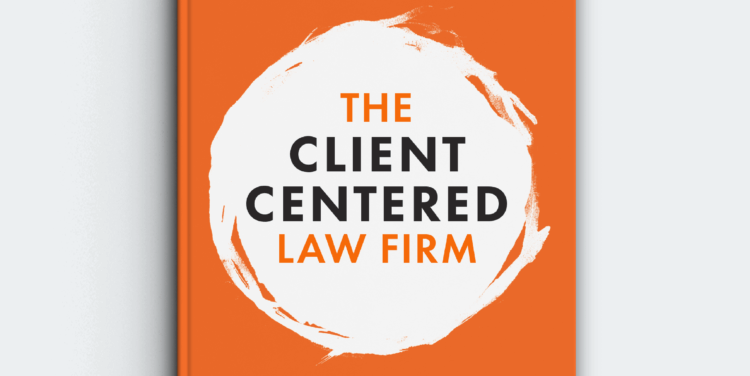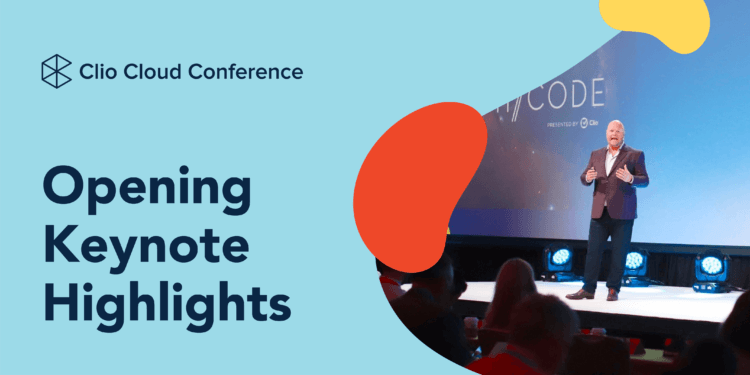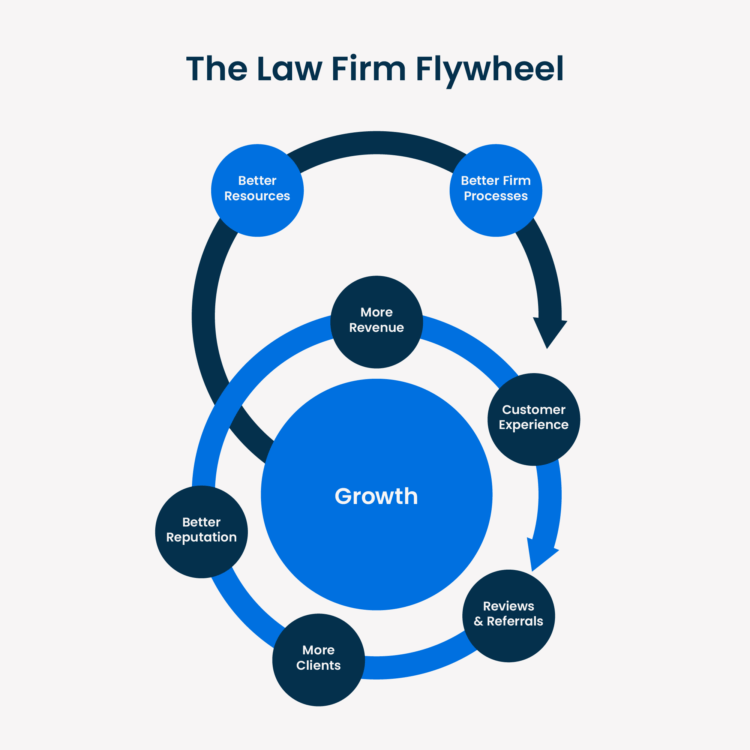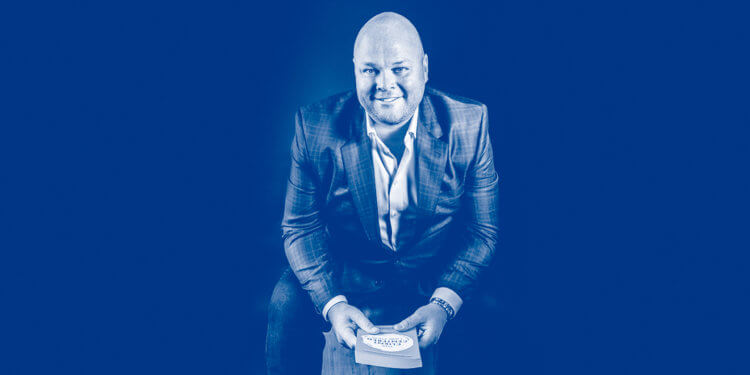
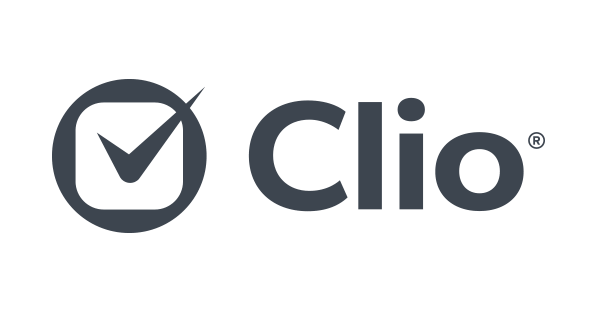
About the episode:
If you learned that the unmet legal needs of consumers amounted to a multi-billion opportunity, what would that mean for the legal industry?
What would it mean for your firm?
In this episode of the Matters legal podcast, Teresa Matich interviews Jack Newton, Clio’s CEO, Co-founder, and author of the new best-selling book The Client-Centered Law Firm. In the episode, Jack speaks about one of the book’s core concepts, the “latent legal market”—and why it matters.
The latent legal market refers to the untapped potential of all the would-be legal clients who aren’t currently using legal services to solve their legal issues. Consequently, it also refers to all the unrealized revenue that law firms could generate if they focused on providing the experience these would-be clients are looking for.
No one understands this better than Jack, whose interview highlights the incredible opportunities the latent legal market presents for law firms.
Our Guests:

Jack Newton
Jack Newton is the CEO and Co-founder of Clio, and a pioneer of cloud-based legal technology. Jack has spearheaded efforts to educate the legal community on the security, ethics, and privacy issues surrounding cloud computing, and is a nationally recognized writer and speaker on the state of the legal industry. Jack is also the author of The Client-Centered Law Firm, a new bestselling book for law firms looking to succeed in our experience-driven age, now available at clientcenteredlawfirm.com.
Host bios:

Teresa Matich
Teresa Matich is the Content Strategist at Clio, where she’s responsible for educating the legal industry on market trends, best practices, and important issues impacting law firms. In her spare time, she enjoys traveling, snowboarding, and traveling to snowboard. Email her at [email protected] or tweet her at @TeresaMatich.

Andrew Booth
Andrew Booth is the technical producer for Matters, and works within the Business Operations department at Clio as the Learning Media Specialist. He is best known as the voice (and sometimes face) of Clio’s training videos. Andrew received his Broadcast Communications degree from BCIT, and has produced work for such broadcasting outlets as Global News and Roundhouse Radio. Email him at [email protected].

Derek Bolen
Derek Bolen is the Senior Manager of Customer Marketing at Clio, which means he gets paid to build relationships with the greatest customers in the world. When he isn’t working, he’s tweeting, reading, writing, podcasting, running, obsessing over fantasy football, or hanging out with his 5 year old son. Email him at [email protected], or tweet him at @hurrrdurrr.

Sam Rosenthal
Sam Rosenthal is a Content Strategist for Clio, specializing in thought leadership and creative content. A graduate of UNC-Chapel Hill’s journalism program, Sam works on literary fiction and screenwriting projects in his spare time. Email him at [email protected], or tweet him at @SamRoseWrites.
Show notes:
- Introduction: Matters producer Teresa Matich introduces Jack Newton, and the concept of the latent legal market.
- Jack describes the latent legal market in his words, and the opportunity it presents for law firms and the legal industry as a whole.
- Jack discusses the access to justice gap, and how addressing the latent legal market addresses the access to justice gap at the same time.
- Jack talks about the benefits of being a client-centered law firm, and why adopting a client-centric approach helps law firms reach a larger segment of the market.
- Jack looks at examples of other latent markets and companies that have thrived by innovating, such as Netflix and Airbnb—then he applies those examples to legal.
- Jack highlights some immediate changes firms can make to become more client-centric and begin meeting the needs of the latent legal market.
- Closing
Transcript
Read full transcript
Teresa Matich: If you learned that the unmet legal needs of consumers amounted to a multi-billion opportunity, what would that mean for the legal industry?
What would it mean for your firm?
I’m Teresa Matich, and this is Matters.
Matters is a podcast presented by Clio, the world’s leading cloud-based legal technology provider, where we look at small changes that can make a big impact on lawyers’ daily lives and practices.
For this episode, I spoke with Jack Newton, Clio’s CEO and Co-founder, and the author of the new best-selling book The Client-Centered Law Firm. Jack and I spoke about one of the book’s core concepts, the “latent legal market”—and why it matters.
In this sense, the latent legal market refers to the untapped potential of all the would-be legal clients who aren’t currently using legal services to solve their legal issues. Consequently, it also refers to all the unrealized revenue that law firms could generate if they focused on providing the experience these would-be clients are looking for.
No one understands this better than Jack, who has helped law firms grow, evolve, and meet changing client needs for more than a decade. A pioneer in the legal technology space, Jack has played a key role in ushering law firms into the cloud computing era—and leading a paradigm shift toward the client-centered approach that will help firms thrive in our experience-driven age.
Jack Newton: I am Jack Newton. I am the CEO and founder of Clio.
Teresa Matich: Thanks, Jack. So, you’re joining us today to talk a bit about the latent legal market, which is sort of an untapped legal market that you talk about in your new book, The client-centered Law Firm. This is a concept that’s been talked about for years in the legal industry, but for those who haven’t heard of it, maybe could you give a brief introduction?
Jack Newton: So, the latent legal market is a really important concept. Like you said, it’s not a new concept. It’s a concept I believe that was first introduced by Richard Susskind in his 1996 book, The Future Of Law. But the really key concept and I think the reason the concept of the latent legal market is more relevant today than it’s ever been is just what a tremendous opportunity that it presents for lawyers that are willing to innovate in the way that they’re approaching the legal market. The reason I think it’s more relevant today than it’s ever been, the opportunities to innovate are more plentiful than they’ve ever been in the history of legal. Tools like technology, the internet, cloud computing, and even using the internet as a medium to communicate and collaborate with clients has really changed the ways that a lawyer can approach the legal market, and the way that they can approach this untapped market that is the latent legal market.
Jack Newton: Maybe I’ll go in a bit of depth just explaining what the latent legal market is, because it’s I assume a concept not everyone in the podcast is familiar with. The basic idea is when we look at the legal market as a $437 billion a year market, which is the annual spend in the US on legal services in sum total, that actually represents a relatively small part of the overall demand for legal services. So, the World Justice Project published a statistic recently that 77% of legal issues went unresolved by a lawyer. So, the $437 billion a year of spend that we see is coming from the 23% of the market that actually got connected with a lawyer and had a lawyer service their need.
Jack Newton: The way I look at the latent legal market, the frame I use is: When we look at it as a product-market fit concept, we can see that there’s actually a relatively small amount of fit between the product—which is legal services as lawyers deliver them today—and the market—which is the people that need help with their legal problems. And the fact that there’s only 23% of that market that actually successfully connected with a lawyer and had a lawyer deliver that service, I think is huge evidence of a disconnect between the way lawyers are delivering legal services and the way consumers want to consume them.
Jack Newton: So, when we look at that 77% of demand for legal services, that is kind of below the waterline and hidden from a typical lawyer. That’s where there’s an enormous opportunity. If you do the math, it’s a trillion-dollar-plus opportunities sitting out there for the taking for lawyers that can figure out how to better bridge the gap between the services they’re offering, the way they’re pricing their services, the way they’re delivering their services, and the consumers that actually want to tap into and access those services.
Jack Newton: I think the really interesting opportunity here is that 80 plus percent of lawyers tell us that they want more clients, they need more clients, and it’s the number one thing they need to find to make their law firm more successful. So, when you look at that disconnect between supply and demand on the legal services market, when you see so many lawyers saying, “I need more clients,” and then you see 77% of the demand side of the market saying essentially, “We need more legal services and need to access them more easily,” that is just an unbelievable opportunity that’s sitting out there for the taking for the lawyers that are willing to innovate and willing to think about new ways of delivering their legal services.
Teresa Matich: Absolutely. I think it’s interesting that you talk about this as a market, because, as you’ve also brought up before, some other people in the legal industry talk about this as a gap, and as you’ve said, Starbucks never looked at the market and saw an access to coffee gap. So, is that a problem of perception in the industry holding people back?
Jack Newton: Yeah. I think the access to justice gap is in my mind an interesting turn of phrase that you hear used in legal circles. I think the dangerous part about referring to the access to justice gap is I hear often the access to justice gap referred to as some kind of externality that somebody else needs to solve—like the bar associations, or the law societies, or some initiative that has funding from public dollars needs to solve the access to justice gap. But I think truly the access to justice gap is exactly the product-market fit problem that we were describing earlier, where you see the fact that there’s 77% of legal needs that go unaddressed by lawyers. A huge part of that access to justice gap can be addressed and bridged by lawyers taking an entrepreneurial view on how they deliver their legal services and how they price their legal services.
Jack Newton: So, I do think that there is an access to justice gap. There’s no question that there’s people that need legal services that aren’t having them met, as evidenced by the World Justice Project Survey, but rather than looking at that as a problem that somebody else needs to solve, I think there’s an enormous opportunity for innovative and entrepreneurial lawyers to look at that as an enormous opportunity for them and for them to move outside of the realm of what we often talk about, which is kind of a fixed market with commodification happening and a race to the bottom in terms of pricing and so on. I think when we see that discourse and see that discussion, it’s really centered around the 23% of the market that’s currently having its needs properly met, or at least met in some form by the way legal services are currently being delivered.
Jack Newton: But, again, I think kind of the growth mindset view, the view looking at the glass as half full is saying, “Great. We’ve got a good start with that 23% of the market and the $437 billion a year of revenue that’s being generated from that portion of the market, but what about this 77%? How can we improve product-market fit between legal services and the solutions that lawyers can deliver to clients and the clients that are clearly shouting out, looking for those services and looking to have their problems solved—but unable, for whatever reason, to successfully connect with a lawyer and have a lawyer deliver those solutions to them?”
Teresa Matich: Right. So, what are your opinions on how lawyers might do that and solve that issue, solve that product-market fit issue?
Jack Newton: That’s where the entrepreneurial part of the equation comes in. I think it’s being client-centered, for one, and working backward from what problems the client is facing, trying to create empathy for the client and truly understanding, what are their problems, what’s the journey that they go through when they are running up to encountering that legal issue, and what does their journey look like after they’ve encountered that legal issue, and how can you inject yourself into that journey to be somebody that can help them progress, and help them resolve that legal issue that they’ve encountered. It’s really understanding the market and understanding that 77% of legal needs that were unmet by a lawyer, understanding what specific slice of that do you want to try to serve, and what are the barriers between people encountering those challenges and yourself that might be able to help them solve those challenges?
Jack Newton: So, those barriers might be awareness. They may not understand that lawyers can help them solve that problem. It may be finding a lawyer. It may be actually connecting with the right lawyer, deciding that. It may be the mode of communication that you ask them to reach out to you, to engage with them on this case. It may be pricing. How are you structuring your fees? How are you structuring your overall product offering to this market? That’s where you see I think all sorts of great examples in the legal marketplace … Hello Divorce is a great example of looking at a pain point that people experience, and looking at a new way of innovating on and delivering services to a segment of the market that has previously been unaddressed or at least under-addressed by existing solutions.
Teresa Matich: Yeah. That’s really interesting. I think what’s also interesting is I’ve heard you talk about this happening in other industries as well, like this is not a problem that’s unique to legal. The problem of an untapped market is something that’s been faced in other areas, and people have actually been able to innovate, and thrive, and access those markets and come out on top. Can you give some of those examples?
Jack Newton: Absolutely. I think one of the really exciting aspects of the latent legal market is that we can move from this zero-sum game kind of perspective on the market, where we look at the $437 billion market that exists today, and say the business I win in this market is business that’s being won from somebody else. Again, this kind of I think inherently threatening mindset that that induces, where you feel like this is a fixed market—me winning is at somebody else’s expense, or vice versa. When you look at the latent legal market, you actually realize that there’s an enormous opportunity to grow the size of the overall legal market and to make the market more a market where people can really thrive and at the same time help bridge this access to justice gap.
Jack Newton: I think there’s a number of examples of disruptors and innovators that have gone into a market and proven that it can be much bigger than the market that existed previously. So, one example I think that everyone is familiar with is Netflix. Netflix came into the market almost 20 years ago. They launched their DVD service and then obviously moved into streaming over the last decade. But they were obviously disrupting a competitor in the form of Blockbuster. You hear this analogy all the time in legal circles that you don’t want to be Blockbuster. You want to be Netflix. But that’s actually not the point I’m making. The point I’m making is actually one that’s more interesting, which is Netflix has grown their revenues to be larger than Blockbuster’s ever were, and to be a significant multiple of Blockbuster’s revenues at the peak of their existence.
Jack Newton: So, part of the story is, yes, Netflix helped put Blockbuster of business. I think Blockbuster helped put itself out of business for a variety of reasons as well. But the important takeaway from that example is actually that Netflix, because it brought an innovative approach to a market, was able to make the market of people consuming videos and TV a much bigger market than Blockbuster was ever able to. I think that’s the analogy that really should get legal professionals excited about the opportunity in legal is that if you’re able to bring some of these innovative approaches to legal service delivery to the market, you’re not just trying to win from the existing market. You can tap into completely new parts of the market, in the same way that Netflix has tapped into an audience that is much broader and much deeper than the market that Blockbuster was ever able to reach.
Jack Newton: There’s some other instructive examples of this. We look at Airbnb, for example, as a player that was able to successfully make home rentals more accessible than they’ve ever been, but this hasn’t been at the expense of hotels. What this has actually done is increased travel worldwide overall. It’s made travel more accessible to more people and there’s more people traveling than there’s ever been in history, so this has actually got a great side effect on the traditional hotel industry, because they’re busier and more successful than they’ve ever been.
Jack Newton: We’ve seen some very traditional industries, like print publications, pivot successfully to digital worlds. We’ve also seen the landscape littered with the carcasses of many industries or many publishers that have not been able to successfully transition to the digital age, but we do have great examples, like the Atlantic and the New York Times, that have been able to very successfully pivot to a digital world and have revenues that are now exceeding the revenues that they had at the peak of their print publications. So, I do think that the opportunity for those that want to innovate and want to pivot aggressively to this new way of innovating, this new way of looking at the market through an entrepreneurial lens, and a new way of leveraging technology to deliver legal services in innovative, new ways can tap into an enormous market that has historically remained untouched by lawyers and the broader legal services industry.
Teresa Matich: Absolutely. Do you have any practical tips for lawyers on how they can get started addressing and accessing this legal market in their own firms?
Jack Newton: Absolutely. So, I would say that one of the most important aspects of being entrepreneurial and working backward from your customer’s needs or your ideal customer’s needs is doing the work of what is often called customer development. That’s understanding who your customer is, who your buyer is, and as I mentioned earlier, the journey they go through—the customer journey that they work through in discovering your legal services, and then what they want from you as you’re delivering legal services to them. In my new book, I describe this approach overall as being client-centric. This idea of being client-centric has so much power in terms of allowing you to truly understand your clients and understand your future clients, importantly, and how you can cater and deliver legal services to them effectively.
Teresa Matich: Yeah. That’s interesting. This focus on client-centric, you also talk about being entrepreneurial, so this doesn’t mean that you’re just focusing entirely on putting your clients before and above everything in your firm and your business. Right?
Jack Newton: That’s right. That’s right. The concept of being client-centric is very different from the idea of saying you’re always putting your client first. I think the problem with using the frame of saying you’re putting your client first is it does imply a trade-off in the sense that you’re not putting your other firm members, or yourself, or your other clients first, and I don’t think that trade-off is necessary. This can be a win-win for everyone involved, where if you’re properly designing your law firm and the way you’re delivering your legal services in a client-centric way, it can actually benefit everyone in a really outsized way. It can benefit you. It can benefit the other members of your law firm. It can benefit the client. This approach is actually a win-win-win that I think “client-first” doesn’t necessarily convey.
Teresa Matich: That’s interesting. So, it’s kind of like you’re accessing this market and that’s great for you and your firm, and your clients are having happier experiences, and you’re also just happier coming to work, and there’s better processes, and you’re more entrepreneurial. So, these things are both kind of happening and feeding into each other. What does that look like in the long-term future for law firms and the legal market?
Jack Newton: So, I think the other concept I described in the book that I think is closely tied to what you just described is this idea of a flywheel. It’s a concept that Jim Collins popularized in his book, Good To Great. The idea basically is that if you can design a flywheel for your business where you’re able to essentially get a virtuous cycle happening between the various inputs that you have in your business, that will become a self-sustaining growth engine for your business, in the same way that a real physical flywheel, as you put all the incremental effort into slowly getting it from a standstill to moving really rapidly, it conserves momentum and keeps moving on its own. The idea is that you can build that same kind of a flywheel for your business.
Jack Newton: So, when you take this client-centric approach, once you’ve tapped into either the existing legal market or the latent legal market, by the way, the client-centric approach works equally well for both. In fact, maybe I’d say it works especially well for the lightened legal market, but it applies strongly to both. When you take this client-centric approach, as you mentioned, you’re getting happier clients. You’ve got happier employees at your law firm. You’re happier. One of the things we see in law firms is that a significant amount of their growth comes from word of mouth and comes from referrals.
Jack Newton: As you take this client-centric approach, you will end up with clients that are happier, more satisfied, and more likely to refer a friend to your law firm, more likely to refer a colleague to your law firm, more likely to leave a positive review for you online. That, of course, is one of the main inputs for a law firm’s flywheel of growth. Oh, and by the way, that client is also more likely to become a repeat client, which is another component of the flywheel of growth. So, when you focus on this client-centric approach, you’re not only going to be able to obtain new clients in a more effective way from the legal market and the latent legal market, but you’re going to have a self-perpetuating growth engine where more and more clients are being referred into your firm and drawn to your firm thanks to the positive client experience that you’re leaving your clients with.
Teresa Matich: That sounds really terrific for most law firms, especially I think the 80% of firms who say they need more clients, as you were mentioning earlier. So, can you tell us a little bit more about what a client-centered law firm looks like? How can a firm be client-centered?
Jack Newton: I talked about five key values that are associated with a client-centered law firm in the book. These five key values are really I think what form a common backbone for law firms that have become successfully client-centered. So, those values are, number one, developing deep client empathy. This concept of empathy and truly putting yourself in the shoes of your clients I think is a really key concept and key to the customer development process I referred to earlier. The second value is practicing attentiveness and being as responsive to your clients as possible. We’ve seen, both in our own legal trends report research at Clio as well as other research in the industry, that responsiveness is one of the key factors that clients use in deciding not only which law firm to work with, but how satisfied they are with the law firm that they work with.
Jack Newton: The third value is generating ease with communication. So, this is the concept of communicating with your clients in the medium of their choosing and in a way that is a good fit with their overall requirements and needs for communications. So, this is calibrating, for example, maybe to a younger client base. Their preferred mode of communication will be text message. That’s recognizing that your different clients will have different requirements when it comes to communication and that you should really work backward from what they want and what they want to see. I think a great example of this even applies to client intake. When you ask a client to phone you, for example, as their first point of contact with your law firm, that can potentially create friction for the many millennials out there that never want to use their phone as a phone, for example. Maybe you should think about online intake tools as an alternative.
Jack Newton: The fourth value is demanding effortless experiences. This concept of effortless experiences is really a central concept that I explore quite extensively in the book, but the key takeaway is that the more effortless you are to work with, the more likely somebody is, number one, to stay loyal to you and to recommend you to others and to have a positive overall experience. So, designing an effortless client experience, looking at your client journey, your customer journey and all of the touch points they have with your firm, and then thinking about how can you design everything around the interaction model with your law firm to be more effortless, and technology can obviously be a big part of that.
Jack Newton: The fifth and final value is creating clients for life, the idea that if you invest in delivering your services in a client-centered way, you will end up with clients that are loyal, that will come back to you for long-term services. Again, it sounds like a common sense idea, but this idea that you should be staying in touch with your clients and staying close to them as they go through either their personal journey or their professional journey and having a better understanding of how you can be helpful to them over that full lifecycle I think is an enormous opportunity that is under-leveraged by most lawyers. So, it’s the idea that you stay in touch, stay close to them, understand how you can continue to help them. So, those are the five key values or tenets associated with a client-centric law firm, and one that any law firm can easily put to work on a daily basis and start to reap the rewards of becoming more client-centric.
Teresa Matich: Yeah. They’re very powerfully framed, but I would agree with you in that they do sound like common sense and very straightforward. What do you think is the biggest barrier for law firms today who haven’t adopted this approach and who aren’t accessing this latent legal market? What’s holding them back?
Jack Newton: It’s a great question. I think that a lot of it falls back to how lawyers are trained, what tools they come out of law school with, and their natural instinct I think to default to the status quo, the way that they’ve seen legal services delivered by their peers, delivered by others in the legal profession, and just this enormous amount of inertia that exists in the legal industry. Part of what I’ve tried to do with this book is really bring an outsider’s perspective in terms of here’s how we approach building really successful product-centric companies like Clio, to the legal market and talk about things like empathy and customer development that are are again common sense topics, but not necessarily embraced by the average lawyer in the way that they’re practicing day to day. Some of the early feedback I’ve gotten on the book is exactly that, that it’s a useful, almost wake-up call, and a call to action to become more client-centric. And there’s opportunity to I think be much more successful, to be much happier, to have happier clients when you take this approach.
Teresa Matich: Absolutely. Do you have any final words of encouragement for our listeners out there who might be hearing you talk about all this opportunity out there, but might be experiencing some of that inertia or maybe smaller or bigger setbacks in front of them before they can get there and access this latent legal market?
Jack Newton: I think that some of the friction that many lawyers encounter when they’re looking at making these kinds of changes is looking at it as a transformative change that needs to be made in one fell swoop, in kind of a boil-the-ocean kind of way, and it doesn’t need to be that way. You can start making very small steps towards being more client-centric in your law firm with very incremental changes. These can be really, really straightforward changes that allow you to better meet the needs of your clients that are significant lifts, and you can just aim to make one of these small improvements every day or every week. You will slowly but surely move on the path of becoming truly client-centric and start to reap those rewards in an incremental way. So, I’d encourage everyone to think about making small steps and feed those into a feedback loop, where you’re looking at the impacts those small changes have made and using those to inform what next set of small changes you want to make are.
Teresa Matich: That’s great. Is there anything else you’d like to add?
Jack Newton: No. I think I’d like to just maybe underscore that I think this is a tremendous, once-in-a-lifetime opportunity that lawyers today have to bring to bear new types of innovation, new types of technology, to deliver legal services in a way that they’ve never been delivered before. That in turn opens up a market opportunity too that is just unprecedented I think, and something that every lawyer that is innovative and entrepreneurial should be incredibly excited about, because there is an opportunity not to just compete with the way that lawyers have been doing business for the last 50 years, but a way of tapping into a huge, huge market that has not had its needs met historically—and an opportunity to truly bridge the access to justice gap. I think that’s a really exciting opportunity.
Teresa: Thank you for listening to Matters. For more episodes, visit clio.com/podcast. And don’t forget to subscribe wherever you get your podcasts, so you never miss an episode.
Matters is produced by Andrew Booth, Sam Rosenthal, Teresa Matich, and Derek Bolen—and by Clio, the world’s leading cloud-based legal technology provider.
If you’d like to learn more about Clio, please visit us at Clio.com
